Timeline
4 January: C.L.R. James is born in the village of Caroni, Tunapuna, Trinidad (a British colony), the first child of Robert Alexander and Elizabeth James. His father is a schoolteacher, a significant position in the colonial Caribbean, and his mother has been educated in a Wesleyan convent.
Tunapuna in 1900 is a small town of about 3,000 inhabitants, 8 miles along the road from Port of Spain, Trinidad’s capital city.
image © about.com geography
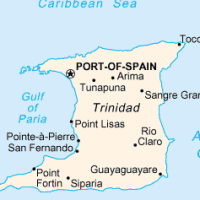
The National Association for the Advancement of Coloured People is founded in New York by prominent black and white intellectuals and led by W.E.B. Du Bois.
image public domain

Wins a scholarship to Queen’s Royal College in Trinidad, the government secondary school in Port au Spain.
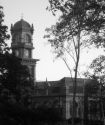
Queen’s Royal College
image courtesy of Chris Fitzpatrick
World War I begins: Austrian Archduke Francis Ferdinand and his wife Sophie are assassinated; Austria declares war on Serbia, Germany on Russia and France, Britain on Germany.
The Russian Revolution. This picture depicts the storming of the Winter Palace in October.
image public domain
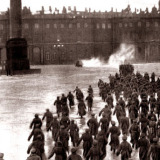
It is announced in the Trinidad Guardian that James has won a prize for his school essay titled Patriotism.
Fails to win the three prestigious scholarships to Oxford and Cambridge due to his cricket and football distractions. Graduates from Queen’s Royal College who offer him the position of history teacher.
C.L.R. James teaches the young Eric Williams who later becomes the first Prime Minister of independent Trinidad and Tobago.
On 6 December 1918, the men of the 9th Battalion of the British West Indies Regiment begin a mutiny known as the Taranto Revolt. Bitterness persists after its suppression, and on 17 December 1918 about 60 NCOs of the BWIR met to form the Caribbean League, calling for equal rights, self-determination and closer union in the West Indies.
The young James plays for Old Collegians cricket club, averaging more than 70 runs as the team enjoy a championship season in Trinidad’s 2nd Division.
After his triumphant debut in 2nd DIvision cricket, James selects to play for the respectable Maple cricket club over its bitter rivals Shannon in Trinidad’s 1st Division. He lives to regret the decision as Maple lose to Shannon (thanks to Learie Constantine) nine times in the following ten years and he misses out on the chance to play alongside his idol, WIlton St Hill.
Paris peace conference. Versailles Treaty signed.
He becomes a founding member of a literary circle in Port of Spain, the Maverick Club. As Secretary he mingles with Trinidad’s aspiring non-white Bohemian set, including C.T.W.E. Worrell, John Theophilus Caesar Prescod and Alfred Mendes.
Captain Arthur Andrew Cipriani joins the Trinidad Workingmen’s Association and successfully represents striking stevedores in November 1919. Despite strong opposition from the port’s shipping agents, who brought in strike-breakers and white British Army troops stationed in Jamaica, the strikers secured a 25% wage increase.
The success of the stevedores strike unleashes a wave of militancy across the island. Trinidad’s governor responds by arresting labour leaders, introducing the draconian Strikes and Lockouts Ordinance (1920) that forbids strikes and requesting naval support and British troops.
Mahatma Gandhi initiates satyagraha (“truth force”) campaigns, beginning his nonviolent resistance movement against British rule in India.
Mussolini marches on Rome; forms Fascist government.
Irish Free State, a self-governing dominion of British Empire, officially proclaimed.
Death of Lenin; Stalin wins the ensuing power struggle and rules until his death in 1953.
Trotsky is expelled from the Russian Communist Party.
Publication of short story La Divina Pastora (originally appears in the Saturday Review)
In the United Kingdom, the Representation of the People (Equal Franchise) Act is passed, giving the vote to all women over the age of 21.
Trotsky is expelled from USSR.
Together with Alfred H. Mendes, he publishes two issues of a pioneering literary magazine, Trinidad. He pens two stories that appear in the magazine’s short life, Turner’s Prosperity and Triumph (Christmas 1929 and Easter 1930).
Publication of short story Triumph (published in first edition of Trinidad)
Publication of short story Turner’s Prosperity.
CLR marries his first wife Juanita Young.
In March 1931, Albert Gomes launches a monthly magazine in Trinidad, The Beacon. Over 28 isssues, James contributes many short stories and non-fiction essays.
The notorious Scottsboro trial begins, exposing the depth of Southern racism in the U.S.
A Defence of the Intelligence of the Negro is published in The Beacon. It is a response to the article Race Admixture by Dr. Sidney Harland also published in The Beacon.
In May 1931, The Beacon publishes James’ short fictional dialogue, Revolution, that recounts the story of a popular uprising defeated by the cowardice of its leaders.
18 March: James lands in Plymouth, UK, while Juanita decides to stay in Trinidad. He stays in London upon his arrival.
Writes essays for Port of Spain Gazette in Trinidad, later collected in Letters from London.
May: Moves to Nelson, Lancashire to stay with Learie Constantine, the brilliant cricketer and friend from home in Trinidad. (below) Learie Constantine batting.
image public domain
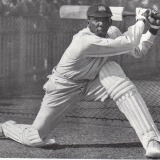
The Nazi party gains 37.4% of the vote in the German Reichstag elections to become the largest party.
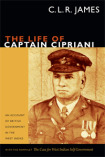
The Life of Captain Cipriani: An Account of British Government in the West Indies. Nelson, Lancs.: Cartmel & Co. (1932).

Nelson, Lancashire.
Image courtesy of Nelson Library.
Introduced to The Decline of the West by Spengler and The History of the Russian Revolution Volume I by Leon Trotsky
Meets friend and sponsor Harry Spencer (the proprietor of a bakery and tea room in Nelson).
Image courtesy of Nelson Library.

Is offered job as the cricket correspondent for the Manchester Guardian after sending Neville Cardus his account of a local match featuring the legendary bowler S.F.Barnes (published 1st Sept)
Visits Paris twice courtesy of Harry Spencer’s sponsorship to research what would become The Black Jacobins.
Election of Hitler in Germany.
The Case for West-Indian Self-Government. London: Hogarth Press (1933). Reprinted, New York: University Place Bookshop (1967); Detroit: Facing Reality Publishing Co. (1967) – shortened version of The Life of Captain Cipriani.
On being offered the job as Cricket Correspondent for the Manchester Guardian, James moves to London (Heathcote Street).
Association with Trotskyist Independent Labour Party (ILP) begins. Attends meetings in Hampstead.
Attends exhibition on African art: ‘the first real impact Africa had on me’
Cricket and I (autobiography of cricketer and friend Learie Constantine, written with Constantine)
Joins Independent Labour Party (ILP) – becomes chair of the Finchley Branch in London.
Mussolini invades Abyssinia (Ethiopia); League of Nations invokes sanctions.
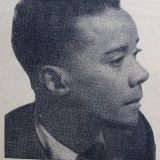
Joins newly formed group:the International African Friends of Abyssinia (later renamed IAFE), which campaigns against Italy’s invasion of the country. This small organisation set up by George Padmore, Amy Ashwood Garvey, Ras Makonnen, James, Jomo Kenyatta, I. T. A. Wallace Johnson and a few others, has a major influence on the development and radicalisation of Pan-Africanism (in 1936 develops into IASB). Image of C.L.R. James courtesy of the Nelson Leader 1935.
Italy annexes Ethiopia.

Minty Alley. London: Secker & Warburg (1936). New edition, London & Port of Spain: New Beacon Books (1971). C.L.R. brought the manuscript with him from Trinidad. It was the first novel to be published by a black Caribbean author in the UK.
Spanish civil war begins.
Visits France to research the Haitian Revolution.
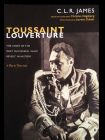
Toussaint L’Ouverture: the story of the Only Successful Slave Revolt in History (play). Produced by Peter Godfrey at the Westminster Theatre, London (March 1936). Starring Paul Robeson.
‘Abyssinia and the Imperialists‘ essay published in The Keys vol. 3 No. 5 (a journal which James regularly contributed to in the early 30s)
James and his Trotskyist Marxist Group leave the Independent Labour Party.
The exiled Leon Trotsky arrives in Mexico on board a Norwegian oil tanker after being condemned to death by the Soviet regime. He lives with the painters Diego Rivera and Frida Kahlo.

World Revolution 1917-1936: The Rise and Fall of the Communist International. London: Secker & Warburg (1937). This attracts the attention of Leon Trotsky as a Trokskyist critique of Stalinism
International African Service Bureau (IASB) founded with George Padmore.
International African Opinion (IAO) published as mouthpiece of IASB with James as editor (only lasts 7 issues)
Italy withdraws from the League of Nations.
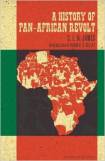
A History of Negro Revolt. Fact monograph no. 18, London (1938). Revised as A History of Pan-African Revolt. Washington: Drum and Spear Press (1969).
The Black Jacobins: Toussaint L’Ouverture and the San Domingo Revolution. London: Secker & Warburg (1938). Revised edition, New York: Vintage Books/Random House (1963). ISBN 0-679-72467-2. Index starts at page 419. Library of Congress Card Number: 63-15043. New British edition with Foreword, London: Allison & Busby (1980).
September: One of two delegates from Britain to be present at the founding conference of the Trotskyist Fourth International in Paris

Arrives in the U.S.A. in late 1938 after lecture tour sponsored by SWP at request of Leon Trotsky. Image public domain. Leon Trotsky.
Meets Constance Webb and begins correspondence with her which continues for over 10 years (and is collected in Special Delivery).
C.L.R. takes up new responsibilities in the SWP in New York as director of the party’s ‘National Negro Department’.
4-11 April: discussions with Leon Trotsky in Coyoacán, Mexico.
Adopts the pseudonym J.R. Johnson
Germany invades Poland; occupies Bohemia and Moravia; renounces pact with England and concludes 10-year non-aggression pact with USSR.
Image public domain.
German battleship Schleswig-Holstein attacks Polish forts at start of war.

Why Negroes should oppose the war (as “J. R. Johnson”) New York: Pioneer Publishers for the Socialist Workers Party and the Young People’s Socialist League (Fourth International (1939).
Leaves SWP with Max Shachtman, who forms the Workers’ Party.
My friends: a fireside chat on the war (as “Native Son”) New York: Workers Party (1940).
Founds Johnson-Forest Tendency with Raya Dunayeskaya (Leon Trotsky’s former Russian language secretary).
Trotsky assasinated by Stalinist agent (20th August)
Meets Grace Lee Boggs in Chicago
Withdraws from the SWP completely and joins the WP, led by Max Shachtman.
C.L.R. James is the leading theorist in the WP along with Dunayeskaya.
Germany attacks the Balkans and Russia. Japanese surprise attack on U.S. fleet at Pearl Harbor brings U.S. into World War II; U.S. and Britain declare war on Japan.
Image public domain.
Wehrmacht troops cross the borders of the Soviet Union, June 22, 1941.
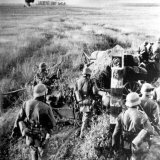
Nazi leaders attend Wannsee Conference to coordinate the “final solution to the Jewish question,” the systematic genocide of Jews -the Holocaust.
Mussolini deposed.
C.L.R. meets and begins a lengthy correspondence with Francis Nkrumah (later to be known as Kwame Nkrumah, the first President of Ghana), who is then a student at Lincoln University, Pennsylvania. He sends a letter of introduction to George Padmore (renowned Trinidadian Communist) when Nkrumah leaves the US for the UK and Nkrumah later credits James with teaching him ‘how an underground movement worked’.
Bretton Woods Conference creates International Monetary Fund and World Bank (July 1–22).
Dumbarton Oaks Conference—U.S., British Commonwealth, and USSR propose establishment of United Nations (Aug. 21–Oct. 7).
Taking over from Churchill, Clement Attlee becomes Britain’s Prime Minister and is perhaps best remembered for setting up the National Health Service.
U.S. drops atomic bombs on Japanese cities of Hiroshima (Aug. 6) and Nagasaki (Aug. 9).

Pan-African Congress held in Manchester – Kwame Nkrumah emerges as a global anti-colonial leader.
Image public domain.
Kwame Nkrumah.
10 January: First meeting of UN General Assembly opens in London.
Marries Constance Webb (forced to divorce and remarry in 1948 as C.L.R.’s divorce to Juanita Young not recognised).
The Invading Socialist Society (with F. Forest and Ria Stone). New York: Johnson Forest Tendency (1947). Reprinted with new preface, Detroit: Bewick Editions (1972).
12 March: Truman proposes Truman Doctrine.
June: Marshall Plan for European recovery proposed.
Johnson-Forest Tendency re-joins Socialist Workers’ Party, and withdraws from the WP.
15 August: India and Pakistan gain independence from Britain.
‘Trotskyism in the United States, 1940-1947: Balance sheet‘ published by JFT and Workers Party, August 20th
‘Dialectical Materialism and the Fate of Humanity’ published as pamphlet by JFT.
‘The American Worker’ published by Johnson Forest Tendency (written by Paul Romano and Grace Lee Boggs).
30 January: Gandhi assassinated in New Delhi.
Notes on Dialectics: Hegel, Marx and Lenin (1948). New edition with Introduction, London: Allison & Busby; Westport, Conn.: Lawrence Hill (1980).
July: C.L.R. gives a speech titled ‘The Revolutionary Answer to the Negro Problem in the USA’ to convention of the Socialist Workers Party outlining JFT’s view of the ‘Negro struggle’ having ‘a vitality and validity of its own’.
Deportation proceedings begin against James. From 1948 until his deportation in 1953 James is working on a translation from French of Daniel Guerin’s study of the French Revolution. Copies of the manuscript are housed in the C.L.R. James collection at the University of Trinidad.
Truman ends racial segregation in US military.
C.L.R. James Jnr (“Nobby”) born (4th April)
4 April: Start of North Atlantic Treaty Organization (NATO)
1 October: Communist People’s Republic of China formally proclaimed by Chairman Mao Zedong.
7 October: German Democratic Republic (East Germany) established under Soviet rule.
South Africa institutionalizes apartheid.
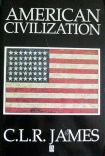
C.L.R. James begins to draft manuscript published posthumously as ‘American Civilization‘ (1993).
Notes on American Civilisation. Typescript [1950], Published as American Civilization, Oxford: Blackwell (1992).
25 June: Korean War begins when North Korean Communist forces invade South Korea.
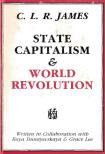
State Capitalism and World Revolution (1950). Written in Collaboration with Raya Dunayevskaya & Grace Lee. New edition with foreword by James and introduction by Paul Buhle, Chicago: Charles H. Kerr (1986).
McCarthyism begins.
Correspondence Publishing Committee created. Led by C.L.R. James and Martin Glaberman (and including members of Johnson-Forest Tendency). Formally splits from Trotskyist groups.
November:First edition of Correspondence published.
24 December: Libya gains independence.
Letters to Literary Critics. (1952/53 – including Jay Leyda [Melville scholar], Meyer Schapiro [poet, editor, critic], Frank Kermode [UK literary critic]). Published in CLR James Reader.
Imprisoned in Ellis Island for 4 months by US Immigration Officials (part of the heightened political repression against communists). Writes Mariners, Renegades and Castaways while incarcerated there.
(below) Ellis Island’s Immigrant Landing Station. Image public domain.
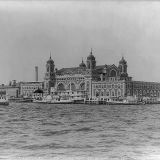
While C.L.R. was still on Ellis Island, he spearheaded the creation of the “Third Layer School,” where rank-and-file workers, women, and youth did the talking and intellectuals did the listening.
5 March: Stalin dies. Malenkov becomes Soviet premier; Beria, minister of interior; Molotov, foreign minister.
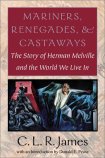
Mariners, Renegades and Castaways: The Story of Herman Melville and the World We Live In. New York; privately printed (1953). Reprinted, London: Allison & Busby (1984).
Gives public lectures on American and European literature as part of case to remain in the USA.
Appeal for U.S. citizenship turned down and forced to leave U.S. James was deported to the U.K. on grounds of being a Communist alien agitator under the new McCarren Act.
James ends marriage with Constance Web.
Notes on Hamlet, lecture given by James at the Institute of Arts and Sciences, Columbia Unniversity, New York. Later published in the CLR James Reader
Editor of journal: International African Opinion (published ’53-’57)
17 May: U.S. Supreme Court (in Brown v. Board of Education of Topeka) unanimously bans racial segregation in public schools.
Colour Bar (written with Learie Constantine).
Filomena Daddario and Grace Lee Boggs spent the Spring of 1954 in London working with James.
Popular Art and the Cultural Tradition. (Lecture given in Paris at a conference on Mass Culture). Published in the CLR James Reader.
November: Algerian War of Independence against France begins; France struggles to maintain colonial rule until 1962 when it agrees to Algeria’s independence.
Preface to Criticism. (extract from unpublished documents on literary criticism) Published in C.L.R. James Reader.
Raya Dunayevskaya splits from Correspondence group.

1 December: Rosa Parks refuses to sit at the back of the bus. Martin Luther King, Jr., leads black boycott of Montgomery, Ala., bus system; desegregated service begins on 21 December 1956.
(left) Black Residents Walking, Montgomery Bus Boycott, 1955. Image public domain
April: Morocco gains independence.
Every Cook Can Govern. Essay printed in Correspondence.
Marries Selma Weinstein who has come to the UK from the US with 6 year old son.
Fellow Correspondence member and long time American sponsor of James, Lyman Paine spends ‘several months’ in London with James.

Workers’ uprising against Communist rule in Poznan, Poland, is crushed (June 28–30); rebellion inspires Hungarian students to stage a protest against Communism in Budapest (Oct. 23); Hungarian rebellion forces Soviet troops to withdraw from Budapest.
(left) A Soviet tank attempts to clear a road barricade in Budapest, October 1956. Image public domain.
Letters on Politics (letters sent to Correspondence members 1956-1960). Published in CLR James Reader.
Grace Lee and James Boggs visit C.L.R. in London.

Ghanaian independence.
(left) Vice President and Mrs. Pat Nixon, pictured here with Ghana’s finance minister, K. A. Gbedeman, at the Ghana independence celebrations in 1957. Image public domain.

March: C.L.R. James joins George Padmore in Ghana to see its independence and promises book in Ghana.
(left) George Padmore. Image public domain.
24 March: Back in London, with his wife Selma and the Barbadian novelist George Lamming he meets with Martin Luther King to discuss the Montgomery bus boycott.
Facing Reality (with Cornelius Castoriadis and Grace Lee Boggs) Detroit: Correspondence (1958).
Former student of C.L.R. James, Dr Eric Williams becomes the prime minister of Trinidad.
September: George Padmore, James’s close childhood friend and comrade dies
C.L.R. James has written the majority of Beyond A Boundary (up to Ch. 17) and the first half of his book on Ghana by this point.
December: Returns to Trinidad to edit the PNM Weekly newspaper (which he reorganises and renames as The Nation) for the pro-independence People’s National Movement (PNM) party alongside sitting as secretary of the West Indian Federal Labour Party (following an invitation from PNM leader Eric Williams).
Writings from The Nation (articles written by James from The Nation 1958-60). Published in the C.L.R. James Reader.
C.L.R. accepts party-imposed discipline in his editorship of The Nation.
28 February: James publishes his first editorial in The Nation on the subject of the captain of the West Indies cricket team, with the headline, ‘Frank Worrell Must Captain’. It argues for an end to the colonial policy that the captain of the West Indies must be white, and instead puts forward that the Barbadian batsman Worrell should become the first appointed black captain of the team. Between now and April 1960, James campaigns from the pages of The Nation for this goal.
1 January: Cuban President Batista resigns and flees—Fidel Castro takes over.
Senegal, Ghana, Nigeria, Madagascar, and Zaire (Belgian Congo) gain independence.
Modern Politics (a series of lectures on the subject given at the Trinidad Public library, in its Adult Education Programme). Port of Spain: PNM Publishing Co.(1960).
March: Writing in The Nation, as part of his growing campaign to appoint Frank Worrell the West Indies captain, James states “The Board should know that the eyes of the world are upon them. Yes, the eyes of the world. Not to select Worrell would be an act of war.”
April: Frank Worrell is appointed captain of the West Indies cricket team ahead of the team’s Australian tour. Although they lose the tour 2-1, the matches are close and aggressively fought and the Australians honour Worrell’s side with a parade in Sydney at the end of the tour.
A convention appraisal: Dr. Eric Williams: first premier of Trinidad & Tobago: a biographical sketch. Port-of-Spain, Trinidad, W.I.: PNM Publishing Co. (1960).
C.L.R. breaks from PNM-imposed discipline.
Eric Williams makes clear his disapproval of James and other ‘fellow travellers’.
C.L.R. breaks alliance with Dr Eric Williams after a series of disagreements over James’s advocacy of the movement for West Indian Independence and Federation. Resigns as editor of The Nation.
Visits Nkrumah in Ghana. Speaks at CPP party event in Accra
C.L.R. accused of mismanaging and possibly stealing PNM party funds.
Modern Politics confiscated by order of Williams government.
Grace Lee and James Boggs visit C.L.R. in Trinidad for 5 weeks.
3 January: U.S. breaks diplomatic relations with Cuba.
17 April: Cuba invaded at Bay of Pigs by an estimated 1,200 anti-Castro exiles aided by U.S.; the invasion is crushed.
A car accident leaves James weakened for over 2 years. Requires round-the-clock attention from Selma for almost a year.
13 August: East Germans erect Berlin Wall between East and West Berlin.
Party Politics in the West Indies. San Juan, Port of Spain: Vedic Enterprises (1962).
Grace Lee Boggs, James Boggs, Freddy Paine and Lyman Paine split from CLR James and Martin Glaberman but continue publishing.
C.L.R returns to London from Trinidad .
31 August: Trinidad achieves independence from the U.K. Burundi, Jamaica, Western Samoa and Uganda are other countries to achieve independence in 1962.
August – November: Cuban missile crisis-USSR attempts to build missile bases in Cuba; President Kennedy orders a Cuban blockade, which he lifts only after Russians back down.
Most of his book on Ghana is finished by end of 1962.
Marxism and the intellectuals, Detroit, Facing Reality Publishing Committee (1962).
A revised second edition of The Black Jacobins is published. It includes minor alterations to the text by James and the inclusion of a new appendix, From Toussaint L’Ouverture to Fidel Castro.
28 August: A civil rights rally is held by 200,000 blacks and whites in Washington, D.C.; Martin Luther King delivers his “I have a dream” speech.
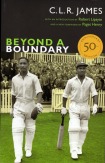
Beyond a Boundary. London: Stanley Paul/Hutchinson (1963). New edition, New York: Pantheon (1984).
Kenya achieves independence.
11 June: The South African government sentences Nelson Mandela to life imprisonment.
1 February: Rev. Dr. Martin Luther King, Jr., and more than 2,600 other blacks are arrested in Selma, Alabama, during three-day demonstrations against voter-registration rules.
21 February: Malcolm X, the U.S. black-nationalist leader, is shot and killed at a Harlem rally in New York City.
C.L.R. returns to Trinidad (initially to cover a Test match) and stays until the end of 1966.
Placed under house arrest for 6 weeks when he arrives in Trinidad.
Founds the Workers’ and Farmers’ Party with Stephen Maharaj and George Weekes (president of the Trinidadian Oilfield Workers Trade Union [OWTU]). Holds the position of general secretary and editor of its paper, We the People.
A stone thrown at James narrowly misses his head at a Workers’ and Farmers’ Party rally. Becomes convinced he is a target for assassination and refuses to leave house without bodyguard for next few months.
James’s defeat in Trinidadian elections- last issue of We the People.
C.L.R. returns to London (end of 1966).
29 January: President Julius Nyrere of Tanzania issues Arusha Declaration.
August: delivers an address in London on topic of ‘Black Power’ praising the civil rights leader Stokeley Carmichael. https://www.marxists.org/archive/james-clr/works/1967/black-power.htm
‘The Black Jacobins’ [play] revised and retitled version of James’ 1936 play is produced by Decter Lyndersay at the University of Ibadan, Nigeria.
January: visits Cuba.
January – February: The Tet offensive, the turning point in the Vietnam War.
24 February – 28 March: C.L.R. visits Nigeria.
28 March: C.L.R arrives in Tanzania.
4 April: Martin Luther King, Jr., is assassinated in Memphis.
April: C.L.R. James returns to London.
May – June: Paris student-led uprising.
26 – 29 July: C.L.R. visits Paris and Marseilles. Meets Daniel Guérin during his visit.
August: C.L.R. spends a month visiting Tanzania (1 week), Kenya (4 days) and Uganda (2 weeks). While in Uganda, he has conversations with young Kenyan writer Ngugi wa Thiong’o.
4 September: C.L.R returns to London.
20 September: C.L.R. visits France.
C.L.R. returns to the United States. He lectures widely and teaches for some years at Federal City College, now the University of the District of Columbia, during the period of Martin Luther King’s assassination and the rise of Malcolm X and the militant Black Panther party. James supports The Student Non-Violent Co-ordinating Committee (SNCC) leader Stokely Carmichael who advocates Black Power. He remains there for a further 12 years.
28 June: The Stonewall riot in New York City marks the beginning of the gay rights movement.
15 January: Biafra surrenders after a 32 month fight for independence from Nigeria.
1 March: Rhodesia (now Zimbabwe) severs ties with the UK and declares itself a racially segregated republic.
A special edition of the journal Radical America is published on C.L.R. James. It is the first attempt to anthologise James’ most important writings.
1 May: U.S. troops invade Cambodia.
Facing Reality is disbanded at Martin Glaberman’s suggestion. Glaberman forms Bewick Editions in order to keep as much of James’s work in print as possible.
The Black Jacobins is performed for the BBC Radio series ‘Monday Play’.
27 January: The Vietnam War ends with the signing of peace pacts.
15 August: The U.S. bombing of Cambodia ends, marking an official halt to 12 years of combat activity in Southeast Asia.
April: Pol Pot and Khmer Rouge take over Cambodia
The documentary film-maker Mike Dibb makes an hour long BBC Omnibus film featuring James. Titled Beyond a Boundary, and shot in the UK and Trinidad, it is based on James’ 1963 book of the same name.
Nkrumah and the Ghana Revolution. London: Allison and Busby; Westport, Conn.: L. Hill (1977).
The Future in the Present, Selected Writings, vol. 1. London: Allison and Busby; Westport, Conn.: L. Hill (1977).
15 February: Rhodesia’s Prime Minister Ian D. Smith and three black leaders agree on the transfer of power to black majority rule.
16 January: the Shah leaves Iran after a year of turmoil; he is replaced in February by revolutionary forces under the Muslim leader, Ayatollah Ruhollah Khomeini.
3 May: the Conservatives win the British general election; Margaret Thatcher becomes the new Prime Minister.
Spheres of Existence, Selected Writings, vol. 2. London: Allison and Busby; Westport, Conn.: L. Hill (1980).
Walter Rodney, leader of the Guyanese Working People’s Alliance and close associate of James is assassinated (13 June).
C.L.R. moves above the Race Today (edited by his nephew Darcus Howe) office in Brixton. Lives there until his death.
A special edition of the journal Urgent Tasks (Number 12, 1981) is published, edited by his later biographer Paul Buhle. It is the first collection of writings about James. It is later republished in 1986 as CLR James his Life and Work.
2 April – 15 June: British overcome Argentina in the Falklands war.
4 June: Israel invades Lebanon in attack on P.L.O.
80th Birthday Lectures. London: Race Today Publications (1983)
A short British film featuring James in dialogue with the historian E. P. Thompson is broadcast. Six filmed lectures presented by James (on the topics: Shakespeare, Africa, Cricket, Caribbean, Solidarity in Poland and American Society) are also broadcast around this time on Channel 4.
25 October: U.S. and allies invade Grenada.
The C.L.R. James Institute was founded with James’s blessing by Jim Murray in 1983. Based in New York, and affiliated to the Centre for African Studies at Cambridge University, it has been run by Ralph Dumain since Murray’s death in 2003.
At the Rendezvous of Victory, Selected Writings, vol. 3. London: Allison & Busby (1984).
Mike Dibb’s second film featuring James, C. L. R. James in conversation with Stuart Hall is broadcast on Channel 4.
C.L.R. James Library in Dalston Lane, Hackney was named in his honor in 1985. James attended the library’s naming ceremony, and his widow, Selma James, attended a reception there to mark its 20th anniversary in 2005.
7 February: The Haitian president Jean-Claude Duvalier flees to France.
Cricket (selected writings, ed. Anna Grimshaw). London: Allison & Busby; distributed in the USA by Schocken Books (1986).
C.L.R. was awarded the Trinity Cross, the highest distinction in Trinidad.
The Black Jacobins (play) produced by Yvonne Brewster of the Talawa Theatre Company at Riverside Studios, London.
19 April: Tens of thousands of Chinese students take over Beijing’s Tiananmen Square in rally for democracy
Death: 19th May, 1989 (aged 88) – his body is buried in Tunapuna, Trinidad.
His tombstone is designed as a book, opened to a page inscribed with one of the most memorable passages from Beyond a Boundary:
“Times would pass, old empires would fall and new ones take their place, the relations of countries and the relations of classes had to change, before I discovered that it is not the quality of goods and utility which matters, but movement; not where you are or what you have, but where you have come from, where you are going, and the rate at which you are getting there.”
At the time of his death James had been working on a new edition of ‘World Revolution 1917-1936’ with London-based group ‘Socialist Platform’.
14 August: P. W. Botha quits as South Africa’s president.
11 November: After 28 years, the Berlin Wall is open to the West.